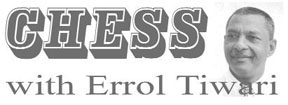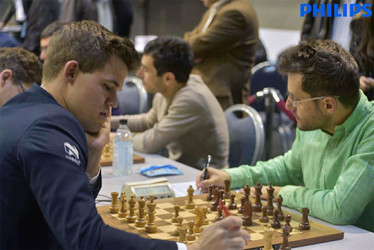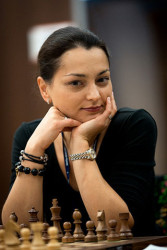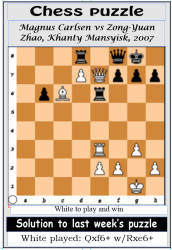The European Team Chess Championships remain the world’s third most pre-eminent team tournament. It is surpassed in elegance only by the World Chess Federation’s extravaganza, the grand two-year-apart Chess Olympiad and the World Team Championships. At this year’s European Championships, 36 men’s and 30 women’ teams contested the biennial tournament. Alternately, at  the 2014 Olympiad, 172 nations participated in an exhilarating display of prominent chess encounters. Each nation chooses its finest players to be their representatives. The separate tournaments, however, have their own merits. The world chess champions and several top ten players, have their origins in Europe. With reference to the world champions, the notable exceptions who are not Europeans, are Capablanca (Cuba), Fischer (USA) and Anand (India). It stands to reason therefore that the European Championships are equal in rigour to the mighty Olympiad and all other tournaments which are contested globally.
the 2014 Olympiad, 172 nations participated in an exhilarating display of prominent chess encounters. Each nation chooses its finest players to be their representatives. The separate tournaments, however, have their own merits. The world chess champions and several top ten players, have their origins in Europe. With reference to the world champions, the notable exceptions who are not Europeans, are Capablanca (Cuba), Fischer (USA) and Anand (India). It stands to reason therefore that the European Championships are equal in rigour to the mighty Olympiad and all other tournaments which are contested globally.
Team Russia was ahead of the contenders vying for exemplary honours at the 2015 European Champion-ships, which ends today in Reykjavik, Iceland. Russia has had an extraordinary spate of victories dating back to when it competed as the Soviet Union in 1957, when the tournament started.
The Soviets won nine times, which is startling since the Championships were held every four years in the beginning then three and now two years apart. Russia, by itself, claimed the title of European champions thrice when the tournament became a biennial one in the nineties. Two of Russia’s fiercest challengers were once part of the Soviet Union: Azerbaijan and Armenia.

In this the 2015 Championships, Russia is the top seed at an average collective rating of 2743 in the men’s department; Georgia holds the identical status with a rating of 2517 for the women. The winning team in both sections gets a direct entry into the next World Team Championships.
A curious novelty is that the tournament is being played at the famous Fischer-Spassky match venue of 1972. Added to that, participants of the Championships would be taken on a guided tour of Fischer’s grave site. Bobby Fischer became a subject of Icelandic folklore following his enormous victory over Boris Spassky in September 1972. Icelanders felt he had boosted their tiny nation to international prominence. Fischer lived his final days in Iceland and was buried there.

At the conclusion of round five, Russia had made an impactful statement on the Championships, leading in both the men’s and women’s departments. The women’s team was in great form with a perfect score of 10.0 points from ten games. The men, however, were held to a draw by Azerbaijan. Yet with a score of 9.0 from ten, the Russians enjoyed a one point lead over the entire field. The big news, however, one that actually diminished the achievements of the Russians, is the fact that Carlsen lost twice but not to a Russian. He lost to Armenian Levon Aronian in the third round, and Swiss Yannick Pelletier in the fifth. His FIDE rating has plummeted to a low of 2832 from 2850 but still higher than the Bulgarian grandmaster Veselin Topalov, 2803, and the rest of the chess world! Pelletier caught two big fishes recently; Carlsen and Hikaru Nakamura at the European Club Cup! The Championships are a nine-round Swiss, and conclude today.
Chess games
The 20th European Chess Championship is currently underway in Reykjavik, Iceland and concludes today. It features Carlsen, Aronian, Vachier-Lagrave, Giri and Grischuk, among others.
White: Magnus Carlsen
Black: Levon Aronian
1. e4 e5 2. Nf3 Nc6 3. Bb5 Nf6 4. d3 Bc5 5. O-O Nd4 6. Nxd4 Bxd4 7. c3 Bb6 8. Na3 c6 9. Ba4 d6 10. Bb3 a5 11. Nc4 Ba7 12. a4 O-O 13. Bg5 h6 14. Bxf6 Qxf6 15. Nxa5 d5  16. Bc2 dxe4 17. dxe4 Rd8 18. Qe1 Qg5 19. Kh1 Rd2 20. Bd1 Be6 21. b4 Rad8 22. Nxb7 Bc4 23. Nxd8 Bxf1 24. Qxf1 Rxf2 25. Qg1 Ra2 26. Rxa2 Bxg1 27. Kxg1 Qc1 28. Kf2 Qxd1 29. Nxc6 Qb3 30. Rd2 Qxc3 31. Rd6 Qb2+ 32. Ke3 Qa3+ 33. Kf2 Qxa4 34. Nxe5 Qc2+ 35. Kf3 f5 36. Rd3 fxe4+ 37. Kxe4 Qxg2+ 38. Nf3 Qg4+ 39. Ke3 g5 40. Kf2 Qf5 41. Rd8+ Kg7 42. Kg2 g4 43. Nd2 Qe6 44. Nf1 Qc6+ 0-1.
16. Bc2 dxe4 17. dxe4 Rd8 18. Qe1 Qg5 19. Kh1 Rd2 20. Bd1 Be6 21. b4 Rad8 22. Nxb7 Bc4 23. Nxd8 Bxf1 24. Qxf1 Rxf2 25. Qg1 Ra2 26. Rxa2 Bxg1 27. Kxg1 Qc1 28. Kf2 Qxd1 29. Nxc6 Qb3 30. Rd2 Qxc3 31. Rd6 Qb2+ 32. Ke3 Qa3+ 33. Kf2 Qxa4 34. Nxe5 Qc2+ 35. Kf3 f5 36. Rd3 fxe4+ 37. Kxe4 Qxg2+ 38. Nf3 Qg4+ 39. Ke3 g5 40. Kf2 Qf5 41. Rd8+ Kg7 42. Kg2 g4 43. Nd2 Qe6 44. Nf1 Qc6+ 0-1.
White: Alexander Grischuk
Black: Pavel Eljanov
1. e4 e5 2. Nf3 Nc6 3. Bb5 Nf6 4. O-O Nxe4 5. d4 Nd6 6. Bxc6 dxc6 7. dxe5 Nf5 8. Qxd8+ Kxd8 9. h3 Be7 10. Nc3 Nh4 11. Nxh4 Bxh4 12. Ne2 Bf5 13. Nd4 Bd7 14. f4 Be7 15. f5 Bc5 16. Be3 Re8 17. e6 fxe6 18. Nxe6+ Bxe6 19. Bxc5 Bd5 20. Rad1 b5 21. b3 Kc8 22. Rde1 Kd7 23. Bd4 g6 24. f6 Rxe1 25. Rxe1 Re8 26. Rxe8 Kxe8 27. Bxa7 Kf7 28. a4 bxa4 29. bxa4 Kxf6 30. a5 Ke6 31. Kf2 h5 32. Be3 Kd7 33. a6 Kc8 34. Bc5 Be4 35. c3 Bd3 36. a7 Kb7 37. Kf3 Bf1 38. Kf2 Bd3 39. Kf3 Bf1 40. Kf2 Bd3 1/2-1/2.
.
White: Helgi Olafsson
Black: Anish Giri
1. d4 Nf6 2. c4 g6 3. Nc3 d5 4. Nf3 Bg7 5. Bf4 O-O 6. Rc1 Be6 7. e3 c6 8. Ng5 Bg4 9. Qb3 Nh5 10. h3 Bc8 11. Be5 Bxe5 12. dxe5 d4 13. Rd1 c5 14. Be2 Nc6 15. O-O Ng7 16. Qb5 Bd7 17. exd4 cxd4 18. Bg4 a6 19. Qc5 b6 20. Qa3 e6 21. Nce4 Nxe5 22. Rxd4 f5 23. Qd6 Nc6 24. Rd2 Ra7 25. Rfd1 Qe8 26. b4 h6 27. b5 axb5 28. cxb5 hxg5 29. bxc6 Bxc6 30. Nxg5 fxg4 31. hxg4 Ra5 32. Qc7 Rxg5 33. Rd8 Qf7 34. Rxf8+ Qxf8 35. Qxc6 Rxg4 36. Qxb6 Qf3 37. Rd8+ Kh7 38. g3 Rc4 0-1.
White: Vassily Ivanchuk
Black: Peter Svidler
1. e4 e5 2. Nf3 Nc6 3. Bb5 a6 4. Ba4 Nf6 5. O-O Be7 6. Re1 b5 7. Bb3 O-O 8. c3 d5 9. exd5 Nxd5 10. Nxe5 Nxe5 11. Rxe5 c6 12. d3 Bd6 13. Re1 Bf5 14. Qf3 Re8 15. Rxe8+ Qxe8 16. Nd2 Qe1+ 17. Nf1 Bg6 18. g3 b4 19. h4 h5 20. c4 Nf6 21. Bd1 Re8 22. Bd2 Qe5 23. Rc1 Bc5 24. a3 a5 25. axb4 axb4 26. Rc2 Ng4 27. Ne3 Qd6 28. Nxg4 hxg4 29. Qxg4 Bh5 30. Qxh5 Qxg3+ 31. Kh1 Qxf2 0-1.






